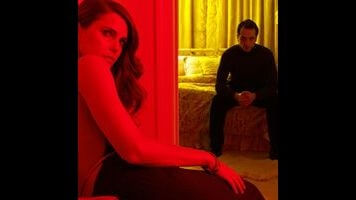FX’s The Americans is poised to turn its pair of brilliant seasons into a troika

Within the first 10 minutes of the third season of The Americans, two significant characters come face-to-face for the first time, exchange blows, and walk away battered and bloody. Despite the gravity of the moment, even devoted fans of the ratings-challenged spy thriller may forget that the two characters haven’t previously met. That’s a testament to The Americans’ disciplined pacing, a rarity in a post-Homeland world where shows about counterintelligence never put off until episode 10 what can be done in episode four.
The Americans’ restraint never comes across as inertia, with a story so finely tuned the show feels neither like it’s burning too quickly nor holding its powder. Showrunners Joe Weisberg and Joel Fields manage this dazzling feat by putting as much attention and care into its people as its plot points. In The Americans, the character beats aren’t inconsequential lulls used to distract the audience while pieces are moved into place. The intimate conversations have as much importance and intensity as the action sequences. Its characters may wear laughably bad disguises, but The Americans is perfectly camouflaged—a patient, well-observed family drama dressed up as a four-on-the-floor spy thriller.
Weisberg, the show’s creator, often says The Americans is primarily about the marriage of Elizabeth and Philip Jennings (Keri Russell and Matthew Rhys), KGB spooks deployed to the U.S. at the height of the Cold War to hide in plain sight as an average husband and wife. The show spent its first season with the Jennings polarized by their misaligned ideologies and struggling to triangulate their feelings for each other while maintaining on-the-job infidelities. In its second season, the couple worked in concert, galvanized by tragedy and resolved to treat their marriage like any other: a partnership that’s only a sham if it’s treated as such. Season three follows through on the chilling note that closed out season two, with the Soviet rezidentura determined to indoctrinate the Jennings’ 14-year-old daughter Paige (Holly Taylor).
This season could easily feel repetitive, given that it puts Elizabeth and Philip back at loggerheads over their disproportionate commitments to the Soviet cause. But the pivot toward Paige and her future reboots the couple’s relationship, and a show that was once about what it means for Elizabeth and Philip to be spouses becomes one about what it means for them to be parents.
Just as The Americans refuses to take sides in the international feud, it’s strictly impartial toward the feuding parents. Philip’s case for keeping Paige out of harm’s way sounds sensible at first. But the show never takes for granted that Philip’s position is right and Elizabeth’s is wrong, especially since carrying out their missions to undermine the U.S. constitutes an indirect assault on their children. They are, after all, raising Paige and her brother Henry (Keidrich Sellati) as typical American youth. As risky as it is to bring Paige into the fold, there’s equal risk in letting her drift further toward an incongruent belief system, a threat that becomes more pronounced as Paige tightens her embrace of Christianity.
As effective as The Americans is as a meditation on marriage, it’s an even more powerful parenting allegory. Elizabeth and Philip watch with equal admiration and horror as their children transform into autonomous individuals. That’s a typical parental experience, but it’s atypically intense for the Jennings, with the ramifications of Paige’s maturation casting shadows over a nation of nearly 300 million—not to mention America.
The theme of diplomacy also wraps around the show, especially in season three, with nearly all of the characters repairing fractured relationships. The Jennings are most successful in a reunion with Gabriel (Frank Langella), a reactivated former handler who approaches them with paternal ambivalence, but never lets it cloud his judgment. The relationship is one of the season’s most refreshing new dynamics, following two years with Elizabeth and Philip under the thumb of people they couldn’t trust. Meanwhile, FBI agent Stan Beeman (Noah Emmerich) tries to reconcile with his wife Sandra (Susan Misner), after his affair with KGB turncoat Nina (Annet Mahendru) cost him his family and got Nina branded a traitor.
The heavy ideas never weigh down The Americans, which remains a nimble thriller with existential angst as merely one of the many balls it’s juggling. In the show’s serialized story, Beeman hones in on Elizabeth and Phillip under the guidance of supervisor Frank Gaad (Richard Thomas), who has yet to discover that his secretary Martha (Alison Wright) is firmly under Philip’s control. But The Americans also excels at balancing its season arcs with episodic maneuvers and multi-episode missions, suffusing them with enough tradecraft and sleight-of-hand to leaven the show with mischievous glee.
Meticulous detail makes the difference between competent television shows and instant classics, and The Americans teems with period minutia, and treats it with a solemn respect not often paid to the ’80s. One scene features a cameo appearance by Frusen Gladje, the obsolete frozen confection as sweet and viscous on the palate as its name is on the tip of the tongue. The ice cream is a symbol unto itself, having vanished under mysterious circumstances following a bruising court battle with Häagen-Dazs. In war—between nations or desserts—there are no winners, only survivors.